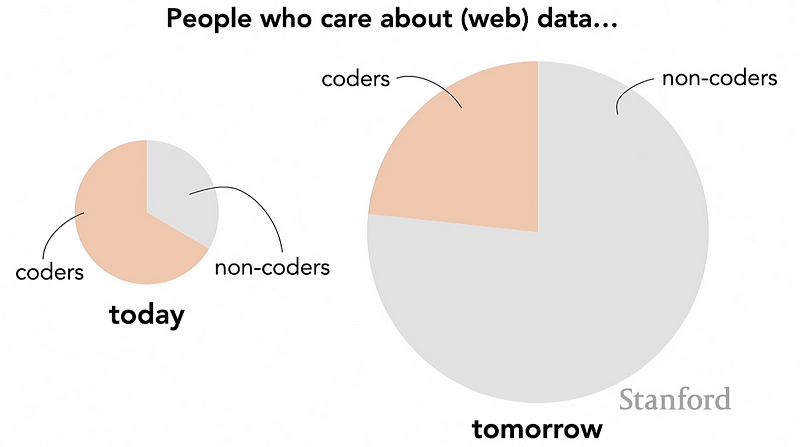Revolutionizing Web Scraping: A New Era for Data Science
Written on
Introduction to Web Scraping's Future
Every day, vast amounts of data are generated online, including news articles, tables, images, tweets, and product details. Some experts argue that data has become the world's most precious resource, surpassing even oil. Historically, automating data extraction through web scraping has been a skill limited to those with programming expertise.
However, this paradigm is shifting. A recent Stanford seminar shared insights on an innovative tool that allows individuals without programming backgrounds to collect datasets from the web and create custom web automation programs. This development promises to significantly impact data scientists and other non-technical users alike.
The Growing Demand for Data Professionals
The interest in web data is skyrocketing, leading to an increased demand for data professionals. Currently, there are approximately 20 million programmers worldwide, yet there are at least double that number of end-users who engage in coding for data-related tasks. These occasional programmers, often from fields like social science and journalism, are now recognizing the immense value of web data.
As the need for web data grows, the landscape of who can work with it will expand beyond traditional coders.

Applications in Various Fields
Social scientists, for instance, may need to extract web data about housing to assist low-income families in finding better living conditions, while political scientists might seek transparency by analyzing government data. This increasing focus on web data means a greater need for individuals who can not only gather data but also clean, analyze, and derive insights from it.
Emergence of User-Friendly Web Scraping Tools
The rise of low-code web scraping tools is noteworthy. Many of these tools come with pre-built templates that facilitate easy scraping of popular websites, along with browser extensions that simplify the process to just a few clicks. Despite their advantages, these tools often have limitations. Navigating the complexities of web scraping remains a challenge, even for those with programming experience.
During the seminar, attendees were introduced to Helena, a tool designed for non-programmers to efficiently gather datasets from the internet and create custom web automation scripts.
The Stanford seminar highlighted an impressive comparison between Helena and traditional tools like Selenium, showcasing how effective Helena can be even for those unfamiliar with it.
Helena: A Game Changer for Data Collection
Helena distinguishes itself from other commercial web scraping solutions. Its adaptive replayer feature ensures that scripts remain functional even as web pages undergo redesigns or obfuscations. Non-coders can manage tasks previously reserved for expert programmers, such as error recovery and parallel processing.
This advancement suggests that if web scraping becomes accessible to a broader audience, data scientists could redirect their efforts from data gathering to more complex model development.
Legal Considerations in Web Scraping
The legality surrounding web scraping is a complex issue, with various interpretations across different countries. Legal frameworks and terms of service dictate whether scraping a particular site is permissible, often leading to case-by-case evaluations. As web scraping becomes more prevalent, legal regulations may tighten, prompting users to consider the implications before proceeding with scraping activities.
Is Learning Web Scraping Still Relevant?
With the proliferation of low-code web scraping tools, some may question the necessity of learning traditional scraping methods. However, it’s important to recognize that these tools have limitations and are unlikely to fully replace established automation languages like Selenium anytime soon. Websites frequently evolve and introduce new features, necessitating adaptations that can be challenging for those without programming skills.
Fortunately, tools like Helena aim to bridge this gap in the near future.
For those interested in mastering web scraping for data science, consider enrolling in a highly-rated course on Udemy. Use the provided coupon for a discount of up to 61%, ensuring that you gain valuable insights at no extra cost to you.